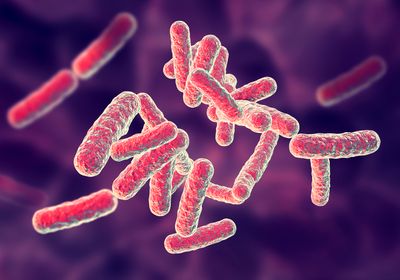ABOVE: © ISTOCK.COM, DR_MICROBE
Millions of people are affected by the debilitating exhaustion and brain fog that characterizes the long-term condition chronic fatigue syndrome (CFS), also known as myalgic encephalomyelitis. Although CFS has been connected to viral infections including COVID-19, the underlying cause of the disease remains unknown.
Now, a study led by researchers at Columbia University Mailman School of Public Health that was published February 8 in Cell is offering new insights that link the condition’s unexplained fatigue symptoms with changes in gut microbe composition. This work suggests the health-promoting gut bacterium Faecalibacterium prausnitzii strongly may reduce exhaustion in individuals with CFS.
It’s a surprising finding, Brent L. Williams, an epidemiologist at Columbia University and senior author of the paper, tells The Scientist in an email. Although deficiency in F. prausnitzii has been associated with a range of health conditions including Crohn’s disease and psoriasis, he explains, CFS has widely varying symptoms, so it’s rather unexpected for one kind of bacteria to have emerged as a key player in their analyses.
Williams and colleagues used fecal microbiome shotgun metagenomic sequencing to identify and measure the relative abundance of specific bacteria in fecal samples from 106 people with CFS who were recruited from five geographically diverse sites across the United States.
The abundances of bacterial genes in their gut were then compared with those of 91 healthy subjects to identify how gut microbiomes differ in cases of CFS. The researchers matched patients with controls based on sex, age, socioeconomic status, and geography.
They found that levels of gut bacteria F. prausnitzii and Eubacterium rectale were reduced in subjects with CFS. These “good” bacteria are responsible for producing butyrate, a fatty acid that breaks down fiber. Reduced levels of butyrate are associated with a range of diseases, such as colon cancer, insulin resistance, and inflammatory bowel disease, and may even factor into COVID-19 severity or duration. Lower levels of the bacteria F. prausnitzii also correlated with the severity of fatigue symptoms in CFS.
Franck Carbonero, a microbiologist at Washington State University who was not involved in the study, admits being surprised by the strong association between F. prausnitzii and CFS fatigue symptoms. But there’s a caveat—“chronic fatigue can go years before getting diagnosed,” he says. “So determining whether reduction in F. prausnitzii is a cause or a consequence of CFS is a real challenge.”
Regardless of the work’s inability to establish a causal link, the finding offers hope for earlier diagnosis of CFS, according to Williams. He argues that the& relationship between F. prausnitzii and fatigue symptoms in CFS “presents potentially actionable targets for future therapeutic trials.” These trials can then bring in the data needed to improve the scientific understanding of the condition.
For now, the group is focused on work that will further prove the relationship between F. prausnitzii levels and fatigue symptoms in CFS using mouse models. This, Williams says, will offer valuable insights for developing and assessing CFS treatments.





